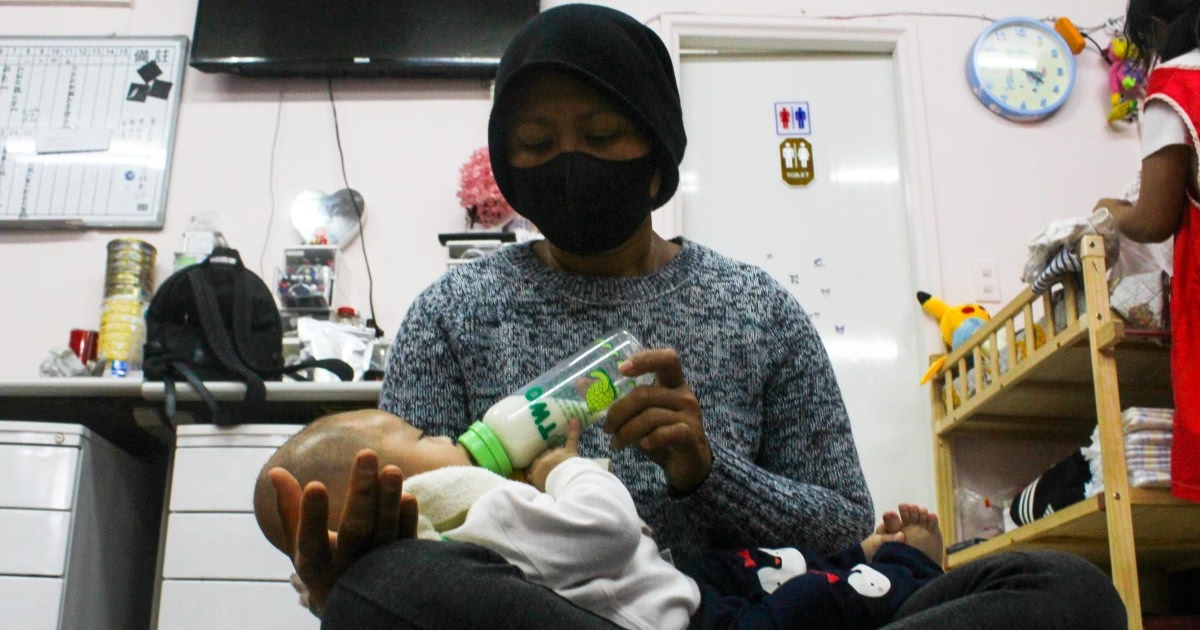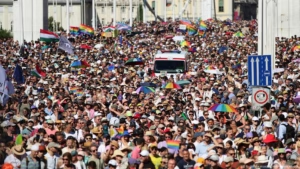Taichung City, Taiwan — Bernard prefers to keep a low profile.
Commuting to his workplace in Taiwan, the 45-year-old Filipino migrant worker often dodges attention and frequently adjusts his face mask to keep his appearance private.
He tends to speak in a near-whisper to conceal his accent.
He frequently declines invitations to social gatherings from his fellow countrymen for fear that a “Judas” amongst them might report him to authorities.
Employment at one of Taiwan’s many electronics factories is how Bernard originally came to the island legally in 2016.
However, since June 2024, he has been living in Taiwan as an undocumented worker. He blames his private employment agent, to whom migrants are commonly assigned, for his predicament.
Bernard claims his employment agent attempted to seize his passport and then urged him to resign without severance payments from his employer.
He resisted both proposals, resulting in a conflict with the agent.
“Agents only communicate during payment-collection times or when looking to deceive you,” Bernard said, requesting a pseudonym for fear of reprisals.
Agents in Taiwan typically take a cut from the workers’ wages and have significant control over employment conditions and opportunities, making for potentially abusive relationships.
After his contract expired in 2022, Bernard said his agent blacklisted him from other employers.
Driven by the need to support his daughter’s education in the Philippines, Bernard chose to overstay his visa to work odd construction jobs, he said.
Today, he feels “like a bird in a cage,” he said, noting that he won’t even voice the words “undocumented” in public, only gesturing to signify that he’s on-the-run.
![Joy Tajonera celebrates Sunday Mass at Taichung Catholic Church in Taichung, Taiwan, on May 23, 2025 [ Michael Beltran/Al Jazeera]](https://www.aljazeera.com/wp-content/uploads/2025/07/Father-Joy-Tajonera-holding-sunday-mass-1751871878.jpg?w=770&resize=770%2C513&quality=80)
Taiwan’s undocumented population is growing rapidly.
Numbers of unaccounted-for migrants have doubled over the last four years, reaching 90,000 in January, according to the Ministry of Labor.
Despite Taiwan’s reputation as one of the few liberal democracies in the region, many Southeast Asian migrant workers live under the constant threat of deportation without access to social services.
Taiwan formalized the broker system in 1992 to streamline labor recruitment.
Agents influence nearly every aspect of a migrant worker’s life, from residence to employment terms and access to public services.
Migrant rights advocates argue that the level of control from agents is prompting many workers to leave their workplaces.
Over a third of all labor-related complaints to the Ministry come from migrants, often concerning agent-oriented issues, according to official statistics.
As of January 2025, Vietnamese workers represented the largest portion of undocumented individuals at 57,611, followed by Indonesians at 28,363, and Filipinos at 2,750.
Joy Tajonera, a Catholic priest heading the Ugnayan Center, a Taichung City migrant shelter, criticizes the Taiwanese government’s lax approach to the matter.
“The system empowers brokers to disadvantage migrants,” Tajonera told Al Jazeera.
“Meanwhile, employers disavow any involvement.”
Agents typically charge migrants a monthly service fee of $50 to $60 and collect various other fees.
In some cases, they enforce age limitations for certain occupations.
Tajonera asserts that many undocumented workers could earn better without agents, “but then you lose all social protections and health insurance. It’s not that they want to flee, but they’re tired of the situation.”
‘Shameless and stupid’
The Labor Ministry of Taiwan contends that the spike in undocumented workers is due to pandemic-related disruptions in deportations.
The department claims to improve migrant worker conditions through raising the minimum wage, routine inspections of recruitment agencies, a new suspension mechanism for agencies with high absentee rates, and encouragement for countries of origin to lower agency fees.
“Through pre-employment orientation for migrant workers and comprehensive orientation sessions for household caregivers, the Ministry seeks to increase awareness of legalities, inform migrants about the risks of ‘going missing’, and ensure employer management responsibilities,” the Ministry stated.
However, since last year, the Taiwanese government has increased maximum fines for visa overstays from $330 to $1,657.
Lennon Ying-Da Wang, the director of a public migrant shelter, labels the government’s increase of penalties as “shameless and stupid”.
“Instead of addressing reasons for flight, it will only deter surrender,” he says.
Wang states that the lack of protections, particularly for childcare and fishing industry workers, is the key reason for many migrant abscondments.
Neither industry is subject to Taiwan’s monthly minimum wage of $944, according to the Labor Standards Act.
In practice, Wang says, migrants often receive half of that amount minus agent deductions.
“Migrants simply seek a decent salary,” Wangگوید. “Still, there’s an unspoken rule among agents not to hire those seeking shelter help, which forces them to run away.”
Despite his sympathies, Wang admits that, as the director of a state-funded facility, he cannot take in migrants who have absconded from work, as they are subject to deportation.

Located in a quiet road at the edge of Taipei lies Harmony Home, an NGO serving undocumented young mothers and children.
Though the women and children at Harmony Home cannot be deported for humanitarian reasons, the state does not cover the costs of their care or health needs.
Over the past two decades, Harmony Home has taken in more than 1,600 children, with a recent surge in the minors coming through its doors, founder Nicole Yang reports.
“Last year, we had about 110 new kids. By April this year, we’ve already received 140,” Yang said.
“We also care for another 300 who live at home while their mothers work.”
Li-Chuan Liuhuang, a labor expert at National Chung Cheng University, argues that while the broker system won’t be immediately eradicated, government transparency in the recruitment process and cost structure could be improved.
In Lishan, a mountainous area of Taichung, hundreds of undocumented Southeast Asians work on peach, pear, and cabbage farms for local landowners. The presence of runaway migrants, many who fled fishing trawlers, is not only tolerated but essential for the harvest.
Liuhuang believes that such workers should be allowed to work on farms under proper labor protections, but she doubts public acceptance of the idea.
“The government must commit to more dialogue on this issue,” she argued.
Mary, who wished to remain anonymous, left her job as a childcare worker to work on several mountain farms without documentation after feeling undervalued and ignored her grievances by her agent.

Seated by a cabbage patch, Mary, 46 years old, always felt tensed around city police.
However, the rules are different in Lishan; landowners have an unwritten agreement with authorities concerning runaways, she said.
“There’s no way the boss doesn’t have ties with the police. He’s always informed when they’re coming and tells us not to go out,” she said.
Nevertheless, there’s no guarantee of avoiding maltreatment in the mountains.
After harvests, employers occasionally withhold payments, threatening workers who complain with deportation, Mary said.
“If I report the boss for not paying my wage, I’ll be reported. Who will come to my aid?”, she questioned.







